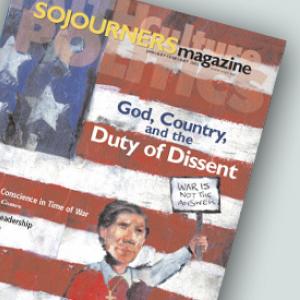
Julie has been a member of the Sojourners magazine editorial staff since 1990. For the last several years she has edited the award-winning Culture Watch section of the magazine. In her time at Sojourners she has written about a wide variety of political and cultural topics, from the abortion debate to the working class blues. She has coordinated in-depth coverage of Flannery O’Connor, campaign finance reform, Howard Thurman, the labor movement, and much more.
She studied English literature at Ohio State University and has an M.T.S. (focused on language and narrative theology) from Boston University and an M.F.A. in creative nonfiction from George Mason University.
Julie grew up on a farm in the northwest corner of Ohio. She has been fascinated by the power of religious expression in and through culture since she can remember. Obsessively listening to her older sister’s copy of the Jesus Christ Superstar cast recording when she was 10 was an especially crystallizing experience. In addition, Julie’s mother often argued about doctrine and the Bible and took her at least weekly to the public library, both of which were useful background for Julie’s current work.
She lives in the Columbia Heights neighborhood of Washington, D.C. and is a member of St. Margaret’s Episcopal Church (where she had an unlikely four-year reign as rummage sale czarina). Her personal interests overlap nicely with her professional ones: Music, books, reading entertainment, culture, and religion writing, art, architecture, TV, films, and knowing more celebrity gossip than is probably wise or healthy. To make up for all that screen time, she tries to grow things, hike occasionally, and wonder often at the night sky.
Some Sojourners articles by Julie Polter:
Replacing Songs with Silence
Censorship, banning, blacklists: What’s lost when governments stifle musical expression?
Extreme Community
A glimpse of grace and abundance from - of all things - reality TV.
The Cold Reaches of Heaven
Nobel Prize-winning physicist Bill Phillips talks about his faith.
Just Stop It
Daring to believe in a life without logos. An interview with journalist Naomi Klein.
Women and Children First
Developing a common agenda to make abortion rare.
Obliged to See God (on Flannery O’Connor)
Posts By This Author
End-of-Life Ethics
A Companion to the Spiritual Life
Flannery O'Connor was a master short-story writer, dark humorist, and astute cultural observer.
The Cold Reaches of Heaven
Nobel Prize-winning physicist Bill Phillips talks about his faith
Martha Stewartship
A Few of My Favorite Things
A few blocks away, a sidewalk mailbox is covered with a magic-marker tribute to a young man downed in a shooting—"RIP Boo"
A New Old Glory?
That Sucking Sound
Catalog Jesus
I confess: I was a catalog girl who grew up to be a catalog woman.
Clowns and Poets and Artists -- Oh, My!
A Revelation in Black and White
Artist Barry Moser's new illustrated Bible shows that the people of scripture---and books themselves---are very much alive.
Shop Before You Drop
Steps to getting the funeral you want and can afford
Know your rights and options. Can you bring a casket purchased elsewhere to a funeral home? Is embalming required? The Federal Trade Commission provides information on the laws regulating funeral goods and services at www.ftc.gov/bcp/rulemaking/funeral/index.htm or call toll-free 1-877-FTC-HELP. Caring for the Dead: Your Final Act of Love, by Lisa Carlson (Upper Access, 1998) covers a wide range of approaches to making funeral arrangements and has state-by-state listings of legal requirements, state-specific consumer concerns, institutions for body donation, and other resources.
Comparison shop. In a 1999 survey of Fort Worth, Texas funeral homes, the price for an immediate burial (no viewing) ranged from $825 to $3,600. So avoid a rip-off by phoning or visiting funeral homes to compare prices. Some local memorial societies can provide a region-specific baseline of fair prices for goods and services. The AARP also provides consumer advice for funerals and related expenses at www.aarp.org/confacts/money/funeral.html. You can also price caskets online—www.directcasket.com is one such retailer. If you are making arrangements due to an unexpected death, have someone who isn’t grieving accompany you to help you ask questions and resist any sales pressure. A specific caveat: Don’t buy "protective seal" caskets. These are sold under the pretense of protecting the body, but because of the action of anaerobic bacteria, reality is quite gruesomely otherwise.
We all have to die. But does it have to cost so much!?
What can churches do about funeral industry rip-offs?
Cheryl Grossman and her husband used to laugh together about all the "rigmarole" that most funeral services involved. So when he died suddenly in October 1997, Cheryl knew that he would want the arrangements to be simple. Grossman, with a friend to support her, went to a funeral home to arrange a direct cremation. The funeral director kept "upselling"—pressing her to consider more expensive alternatives.
"Had I not had a friend who went with me, and had I not had a firm resolve, I probably would have signed anything," she says. "To be manipulated in that way at that time was one of the most obscene things I’d ever experienced."
Cheryl Grossman’s funeral home encounter is a common one. Not so common is how she took her experience to church—and how her church embraced it. Cheryl’s Catholic parish, St. Catherine of Siena in Austin, Texas, has offered a diverse array of practical and pastoral supports to the grieving for some time. Last year Grossman and two other parishioners helped create a death and funeral resource booklet that gathers information on all applicable parish ministries and other area resources in a convenient portable form. It includes specific information on affordable funeral options, planning sheets, and step-by-step advice for those dealing with a death in the family (see "Reclaiming Our Rites," p. 33).
Such a booklet is a simple, straightforward thing, but not every church would know how to welcome it. Most American Christians, including clergy, are almost as comfortable talking about the practical, concrete details of funerals as they are talking about the practical, concrete details of sex. In other words, the topic doesn’t come up much. And unlike sex, funeral planning isn’t a hot topic outside of church either.
Reclaiming Our Rites
The power of ministering to the bereaved
As someone who’s had several deaths in my family, I can testify that prayers and casseroles are both helpful to the grieving process. But they’re not the only things that church people have to offer.
Members and pastors of St. Catherine of Siena parish in Austin, Texas, provide the bereaved with babysitting, transportation help, meals, liturgy planning, accompaniment to the funeral home, a post-funeral reception, bereavement groups, and counseling. Last year parishioners Carole Hawkins, Bob Leidlein, and Cheryl Grossman put together a resource booklet (incorporating materials from the Austin Memorial and Burial Information Society) after having shared their "funeral stories" with one another. They credit Father Oliver Johnson for actively encouraging parishioners to draw from their experiences and create ministries for the whole community.
Grossman is involved in plans for a diocesan-wide conference on the pastoral response to end-of-life issues. "This opens the forum to a large geographic area and a diverse community," she explains. "Folks without many financial or education resources will have access to a wide variety of experience and information."

